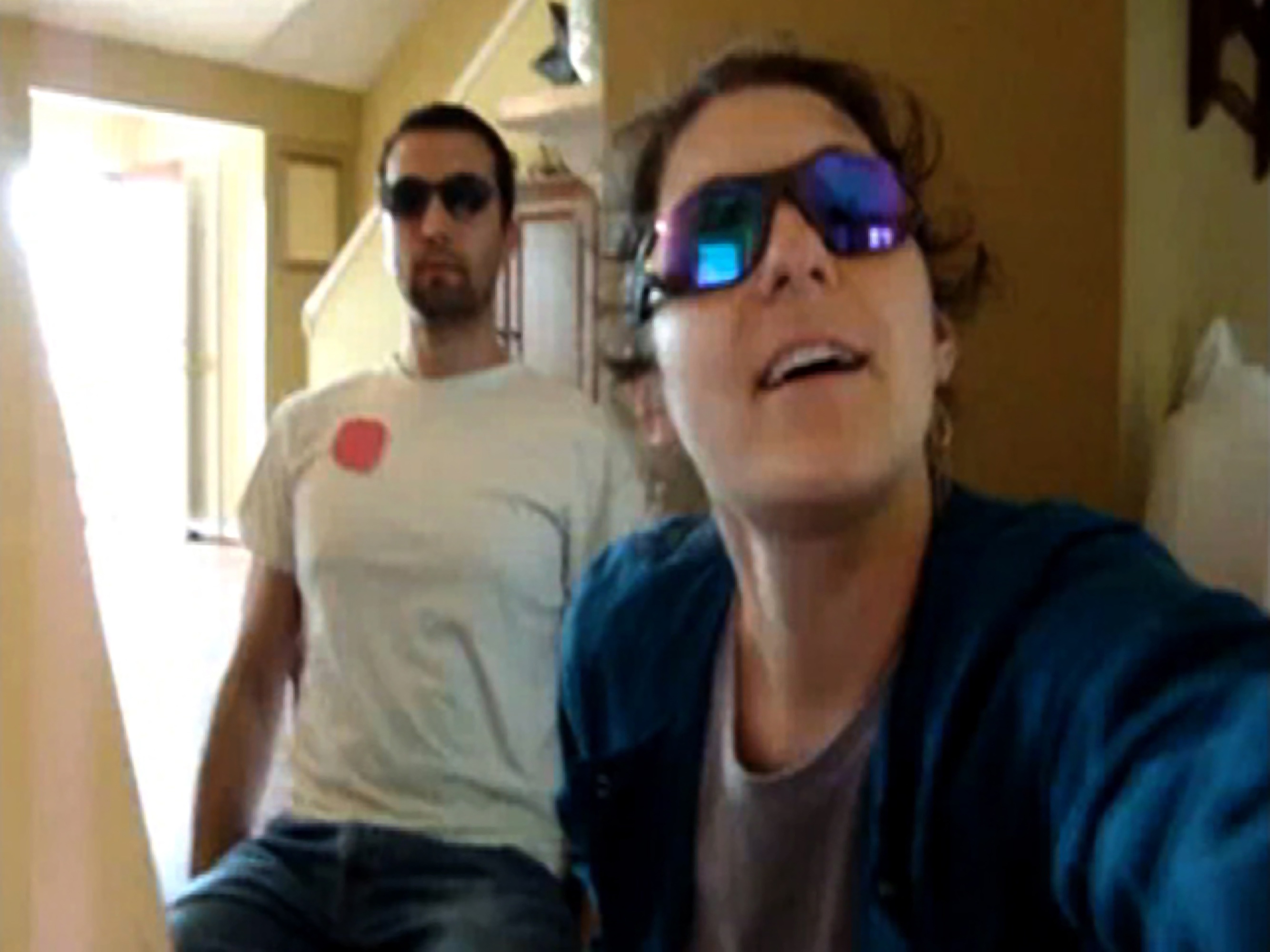Culled from the Net:
Interview with Filmmaker
Dominic Gagnon
1 Mar 2012

All stills are from PIECES AND LOVE ALL TO HELL
Adirector, inventor, performer and filmmaker, Dominic Gagnon is an internationally recognized videomaker (Canada), whose insightful and enigmatic films have screened at Transmediale (Berlin) and the Pompidou Centre in Paris. He has been making videos since the nineties and his work is an exposé of obsession, identity and culture. Gagnon considers 'cinema as a technique for measuring the immeasurable or as a discipline of chaos'.The Internet is featured as a medium of self-representation and its effects on identity and discourse in two recent works: RIP IN PIECES AMERICA (2009) and PIECES AND LOVE ALL TO HELL (2011). These videos are comprised of found footage "flagged for removal" by members of You Tube's general audience. Seeing these clips as victims of Internet censorship, Gagnon undertakes a radical intervention, reintroducing the else wise "hidden" content back to the public via his carefully edited films.
In this interview [undertaken via email] the filmmaker talks about his subjects' various odd and "anonymous" approaches to filming themselves, the diversity of personages in the films, the spread of sameness and Americanized "survivalist culture" as well as his [global] audience reception, particularly among young people.
MH: Mike Landry's interview, which you sent me, probed your technical and editing process. I had some similar curiosities. His perception that Europeans would think one way about the work, and Americans another, is always relevant, but, especially after the Unabomber and 911, our recent brush with home terror...
Gagnon: I had really different reaction 3 years ago, when I screened RIP IN PIECES AMERICA because it came as a shock to people. Now it is different. It seems that audiences, especially the youth, know about all the subjects mentioned in the film.
When people tell me that Americans are "crazy" after watching my videos, I always reply "yes" and that the world must be highly "Americanized" by now because people from so many different backgrounds are getting into "survivalist culture", prepping, as it were, for "the end"
In mid January 2012, I screened it again to students in Amsterdam and they were not laughing much. They were aware of the Stop Online Piracy Act (SOPA) and the National Defense Authorization Act (NDAA), the bills that were about to pass in the US. The characters from my films, who are worrying about free-speech and web sharing community disappearance, were absolutely right to these European students, who were also quite aware of police brutality, abusive controls and arrests, and all the new gadgets of policing. People, regardless of location, are more informed than ever about these pending developments. It is no surprise anymore, for instance, to my audiences, to hear people talk as they do in my films! Also, one fine point...it is not only Americans speaking in my films. The You Tube clips are people from Denmark, England, Italy, Canada, Australia...did you realize that?
When people tell me that Americans are "crazy" after watching my videos, I always reply "yes" and that the world must be highly "Americanized" by now because people from so many different backgrounds are getting into "survivalist culture", prepping, as it were, for "the end", or are revolting against the notion of a new tyrannical world order as if it were all caused by the same stimulus: Hollywood movies, News, conspiracy web sites and TV.

How can you have so many sharing exactly the same "gloom and doom" vision of the future all over the world? Why do they all use a similar vocabulary, the same expressions, or the same references? I think the answer is very simple. It is because they are manipulated. So, "ok", they are manipulated, so we should not worry about conspiracies, right? No, not right.
My stance is this: If there are stupid, popular conspiracy theories, almost forced onto people and endorsed by mainstream media, then there must be a real conspiracy because in the end people are provided with misleading half-truths. These half-truths freak them out so badly that all they can do afterwards is sit alone in front of their computer, consulting dubious websites for new developments on those specific conspiracy theories because no where else is such fear and information to be found. In this way they are neutralized, sitting on their chairs yelling at people to move their asses, showing off their guns and mapping, via the Internet, all the potential resistance to be found against the power structures...Surprisingly, these people seem aware of this frightened form of existence, and, yet, keep on taking part in it. It could almost be called a game-- a role-playing game where they can impersonate someone else; someone they see themselves as. Then comes the Hollywood clichés, in their choice of clothing, characterization, etc.
But, why play that game?
To me, making a film or a video is ritualistic. I get really alienated in the process myself, and by overexposing myself to a lot of information, I get kind of info-drunk, paranoid and scared myself.
...with virtual communities, people can unite and fight, but again, as one character mentions in RIP, "if they want to shut us down, all they have to do is cut off the electricity."
I found this on Wikipedia about fear:The awareness of the end and its existence is in other words the fear of death. The fear of death ritualized the lives of our ancestors. These rituals were designed to reduce that fear; they helped collect the cultural ideas that we now have in the present. These rituals also helped preserve the cultural ideas. The results and methods of human existence had been changing at the same time that social formation was changing. One can say that the formation of communities happened because people lived in fear. The result of this fear forced people to unite to fight dangers together rather than fight alone."
The only remark I would make is that now, with virtual communities, people can unite and fight, but again, as one character mentions in RIP, "if they want to shut us down, all they have to do is cut off the electricity."
MH: You describe yourself as making science fiction documentaries - which are prophetic in that they "come true" - which is an expectation of documentary, i guess. People here in America are steeped in science fiction, even if they don't know much about its film or literary import. It's our technodeterminist angle on things.
Gagnon: Now the NDAA has passed, which is really similar to martial law. Therefore, I don't see RIP IN PIECES AMERICA as a fiction anymore. The last character of the film talks specifically about SOPA-like regulations that are coming. But, that content was from 2008.

MH: The girl film is different...PIECES AND LOVE ALL TO HELL. They all feel a responsibility to nurture or solve "the problem" by taking action while the guys are more apt to just pontificate and yell, as if this is the solution - to have their one voice heard! All these subjects are tragic, clownish figures, and yet, probably also supporting the Tea Party and the National Rifle Association, while secretly or not...some seemed to think they had their own TV show...using the Internet as their independent, "anonymous" broadcast medium.
Gagnon: Yes, you are probably right, but get this...When you dress as a zombie for Halloween and try to scare people, it is a ritual, no? Kids do it to overcome their fears and it is a game to improve their maturity and the control of their mind and body.
My two year old daughter loves to be scared and tries to scare me all the time. Sometimes we get in a situation. She scares me and my reaction scares her. See what I mean?
The characters in my videos get into that same game so well that you may not have noticed that the three African Americans in RIP are all played by the same person and that he lives in The Netherlands and that the only woman in RIP is, in fact, a transvestite and that many are gays. To disagree, I don't feel I am making videos about "clownish, tragic freaks who probably support the Tea Party and the National Rifle Association". My films are about people who regurgitate all the propaganda, all the clichés, all their stress and anxiety in a big, tragic theater play! The only problem is that the act or the play cannot really be seen without an intervention like mine. And, I believe that once it is seen, it can be used to help prevent it. Representation, integration and maturation.
Just remember, I do not make films about people. I make films about people who are filming themselves. That is my major interest. I force myself (in somehow autistic style) to consider those people to be like actors or performers, so I don't have an interest in truth or authenticity. Rather I try to enter into certain mode of representation and projection.
There is also an important factor in all this which is economic. The more you scare people with your You Tube video, the more you get "views" and the more you get "views", the more money you receive in public donation or from You Tube (publicity revenue + sponsors). The men were really unpopular so it was not so much of a money issue, but the girl videos are more terrible. Often, all it takes is tits to get a "view." Some woman in PIECES AND LOVE ALL TO HELL get $2000 a month just for scaring the shit out of people on the Web!
In my new piece, BIG KISS GOODNIGHT: Cocaine, The Holy Spirit and The New World Order', a 60 minute long video that I am working on now, I go really deep into this subject matter. It is called 'cyberbegging' or 'cyber exploitation'.
MH: The girls had some audience to address, adopting more varied modes of address. The girl with no hair, who cuts her hair off in front of the webcam - who appears to need a listener - revisits the cam later, as if it is a friend and confesses to it...sort of Wender's PARIS TEXAS inside out.
Gagnon: Just remember, I do not make films about people. I make films about people who are filming themselves. That is my major interest. I force myself (in somehow autistic style) to consider those people to be like actors or performers, so I don't have an interest in truth or authenticity. Rather I try to enter into certain mode of representation and projection. Paul Virilio once said that "catastrophes contained a lot of information." I would add that the fear of catastrophes contains even more.
____PIECES AND LOVE ALL TO HELL premieres at Other Cinema, March 24, 2012.
Links to Dominic Gagnon filmography, bios, background:
Videomedeja.orgTransmediale.tv